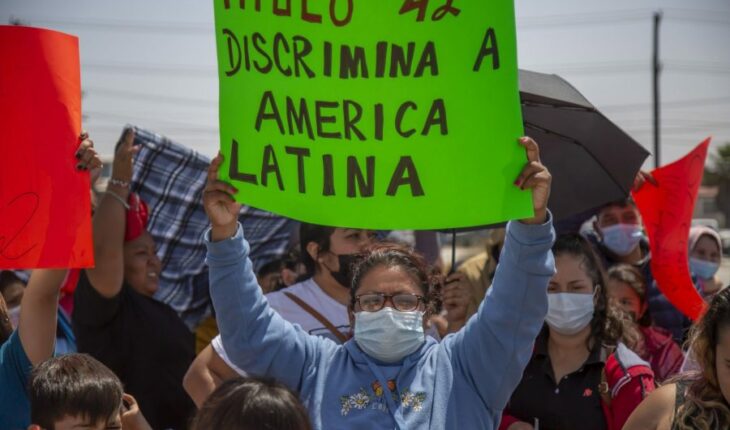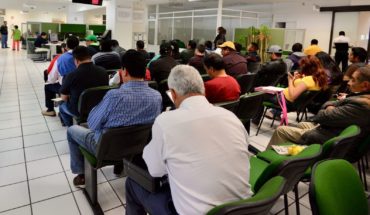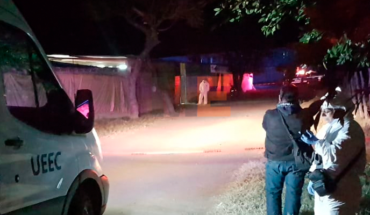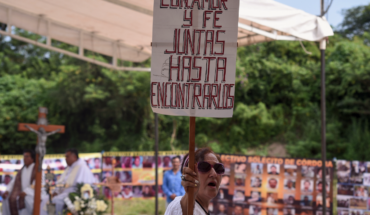Title 42, a policy directly related to the COVID-19 pandemic that since March 2020 allows the expeditious expulsion of migrants for allegedly representing a health risk in the United States, increases the migrant humanitarian crisis. This is warned by civil organizations, after a federal judge in Louisiana prevented this measure from being eliminated, as President Joe Biden had planned for May 23.
For two years, the implementation of Title 42 has resulted in thousands of migrants being returned to Mexico. So far, more than 1 million expulsions based on this policy have been authorized. According to statistics from U.S. Customs and Border Protection, in the first quarter of this year, 386,434 people have been expelled under Title 42.
In addition, as of March 2022, Human Rights First documented at least 9,886 cases of kidnapping, torture, sexual abuse and other violent attacks in the population detained or expelled to Mexico under Title 42, during the Biden administration. According to the organization, breaching refugee protection laws as a response to the COVID-19 pandemic was never justified as a public health measure.
“The Protocol restricting entry into the United States under Title 42 has increased the humanitarian crisis for migrants, especially in northern Mexico. First, under this protocol, land ports of entry at both U.S. borders are closed to ‘non-essential’ flows, which prevents migrants from seeking refuge at official ports of entry,” Mexico’s own government acknowledges in the most recent issue of the report. Contexts. Research on human mobility, dedicated in May to the situation of migrant children and adolescents in the Northern Triangle of Central America.
The restriction is most often used with families from El Salvador, Guatemala and Honduras, who were expelled 34% of the time under Title 42. In the case of families from Brazil, Colombia, Cuba, Ecuador, Nicaragua or Venezuela, on the other hand, this policy was invoked 4% of the time. In many cases, they were returned to a different point than where they crossed, the document warns. Contexts. Mobility research.
Although, according to the organizations, in 2020 due to the mobility restrictions derived from the pandemic and the specific measures of each country, there was a decrease in the number of migrants detained, the increase in 2021 was much more noticeable and has the same upward trend in 2022. Political Animal published on May 16 that there is currently an average of 860 migrants detained daily, a figure that, according to official statistics from the Migration Policy Unit of the Ministry of the Interior (Segob), exceeds the first quarters of 2020 by 158%, 2019 by 143% and 2018 by 151%.
“What we are seeing in Mexico, and from Central America, is the flow of many people arriving at the border between Mexico and the United States with certain things that have not changed, such as Title 42, which was supposedly a measure linked to the Trump administration, disguised as public health but really containment; we continue with that same measure, and that was done in the wake of the pandemic,” says Gretchen Kuhner, director general of the Institute for Women in Migration (Imumi).
The upward trend in immigration detentions, he points out, is due to this policy: “In the opinion of epidemiologists, it was never going to have the effect it was supposed to have had. It was always an immigration containment measure disguised as a public health policy. If there was no reason to implement it from the beginning, now much less.”
According to the organization Ángeles de la Frontera, after two years of the closure of the border and the use of Title 42, the right to request asylum has been completely denied at the southern border of the United States, so several families have been left in a situation of helplessness in Tijuana, Baja California, and live in temporary camps and overcrowded shelters.
Therefore, the association’s Shelter Assistance Program supports 17 spaces in Tijuana, as well as the El Chaparral camp, which emerged at the PedWest port of entry as a result of the Title 42 expulsions, while insisting on the need to end the implementation of this policy and restore the asylum process. Based on this, it has warned about the constant violations of human rights experienced by the migrants housed in Tijuana.
Initially promoted by the Centers for Disease Control and Prevention (CDC) under the Trump administration, and despite the objection of specialists, the Biden administration has given it continuity for political or immigration policy reasons. In August 2021, CDC Director Rochelle Walensky reissued a renewal of Title 42, and has subsequently and repeatedly maintained it, Human Rights First states.
In addition, it states that Title 42 does not protect public health in any way and, in fact, exacerbates the spread of COVID-19. The health argument for continuity has become increasingly evident unjustified, following the suspension of other mobility restrictions related to the pandemic, as well as the elimination of face masks in all US entities.
Gretchen Kuhner highlights these paradoxes, especially notorious in cases such as that of the governor of Texas, Greg Abbott, who for his openly anti-immigrant position, advocates the continuity of Title 42, while in his state a strong movement against the use of masks led to the prohibition of implementing it, at any time, as a mandatory measure. “You have these contradictions; obviously, he is not worried about the spread of COVID, because mandatory measures were never taken; so why would he care in the case of migrants; it’s absurd,” says the specialist.
Although Title 42 was scheduled to end two weeks ago, Imumi warns that there are still many asylum seekers being returned expeditiously, which also entails a series of violations of their human rights. Meanwhile, not only are there signs that the policy will not end, but that it has been strengthened.
Overcrowding of hostels
One of the most important implications of Title 42, according to the organization Integral Human Rights in Action (DHIA), of Chihuahua, is the overcapacity of humanitarian spaces, which are exceeded in capacity. “The shelters, the houses of the migrant, no longer have the greatest possibility of attending humanitarianly, of housing these people, and what is generated is that, eventually, people are in a street situation,” said its director, Blanca Navarrete.
“We are talking about people with high vulnerability profiles, pregnant women, survivors of sexual violence, LGBT people, families, who are left in a street situation in places like Juárez, where we have a gender alert and a high rate of femicides, there is an implication in terms of security,” he added.
In addition, in Chihuahua, the obstacles in the right to health during the post-pandemic are especially worrying for people in general, but in particular for migrants and asylum seekers: “The organizations assume the burden of people being expelled via Juárez, because they were received without the INM having medical attention. Our organization had to take care of medical fees and medicines to attend daily to 100 people who were expelled; we’re going to continue to be the organizations paying the cost of Title 42 returns.”
To all this is added the little collaboration or absence of intervention of the Judicial Branch before the different measures that were taken during the pandemic, because in the case of the amparos that the organizations promoted against this policy and others, they found limitations as basic as that the judge prevented them for not knowing who to notify.
“The amparo in Mexico City was the one that had the most momentum, with a very favorable resolution at the beginning. In 2020, during March and April, they let many people out of migrant holding centers, and then began to detain again. That has been very strong for the organizations that presented it, that there is no final resolution, that the Judiciary cannot make a forceful decision to protect the lives of human beings in the context of a global pandemic, “laments Kuhner.
The issue of the Judiciary has been a very important challenge, he explains, even since they filed an amparo, also in the CDMX, so that the CURP was not requested for the vaccination of migrants. “We thought it was obvious and easy to fix, but we had to make an appeal; we have not had this possibility through the Judiciary to improve the conditions of the migrant population in terms of issues really linked to the impact of the pandemic,” he adds.
The document Contexts. Research on human mobility agrees with the organizations that one of the consequences of the permanence of Title 42 is the installation of informal camps for migrants in Tijuana and Reynosa. “It is estimated that there are between 2,500 and 5,000 people in each of them. These camps did not have the necessary health infrastructure, being the focus of infection of both gastrointestinal diseases and COVID-19. For example, in the camp in Reynosa there was little drinking water and toilets and showers were limited,” the document says. In addition, Human Rights First has warned about the control of criminal organizations that extort, attack, and kidnap their residents.
According to the report, the consequences of this policy are especially worrying in the case of children and adolescents, because although the Biden administration has allowed them to enter unaccompanied, this condition places them in a situation of vulnerability. Because of this change, many families allow their sons and daughters to cross alone, and although there is no accurate data on how many have made the decision to separate, the Border Patrol reported that, between the end of January and the beginning of April 2021 alone, 2,121 unaccompanied minors had previously tried to enter with their families.
More detentions and less access to asylum applications
Refugee claims and apprehensions of migrants in Mexico have increased as President Biden continues to deny access to asylum at the U.S. southern border and pressures Mexican President Andrés Manuel López Obrador to step up efforts to halt migration and increase restrictions, Human Rights Watch (HRW) warns in its latest report on the status of asylum seekers.
“Migrants crossing Mexico’s southern border fleeing violence and persecution face abuse, delays and difficulties in obtaining protection and are often forced to wait near the border for months in inhumane conditions unable to work or find where to live,” the international organization said in the document.
In 2021, HRW highlights, Mexico apprehended 307,569 migrants, the highest number ever recorded in the country, while receiving a record number of refugee applications: 130,863; this is the third highest amount in the world. Most asylum seekers enter Mexico without documentation and arrive fleeing violence or persecution in their home countries.
However, they do not try to apply for protection at an official border crossing for fear of being deported by agents of the National Institute of Migration, that is, most of these people made their request once they were inside Mexico. “A few reported seeking protection at the border and being turned away by INM agents or private security guards. Many said the former had dissuaded them from applying for refugee status in Mexico and pressured them to accept an assisted return to their countries,” the report said.
All this is related, according to the organization, to President Biden’s persistence to maintain “many of the abusive policies of former President Donald Trump,” which include pressuring Mexico to prevent arrival at the border and blocking access to asylum at the southern border with policies such as Title 42 and Stay in Mexico. “President López Obrador has deployed nearly 30,000 troops along with INM agents to detain undocumented migrants across Mexico,” HRW said.
The organization adds that police, prosecutors, military and criminal groups in Mexico commit serious and widespread arbitrary detentions, torture, extrajudicial executions, enforced disappearances and abuses against migrants that are rarely investigated or penalized, while the Mexican government expands the functions of the Armed Forces to include controlling irregular migration and replacing civilian authorities in public security tasks.
What we do at Animal Político requires professional journalists, teamwork, dialogue with readers and something very important: independence. You can help us keep going. Be part of the team.
Subscribe to Animal Político, receive benefits and support free journalism.#YoSoyAnimal





